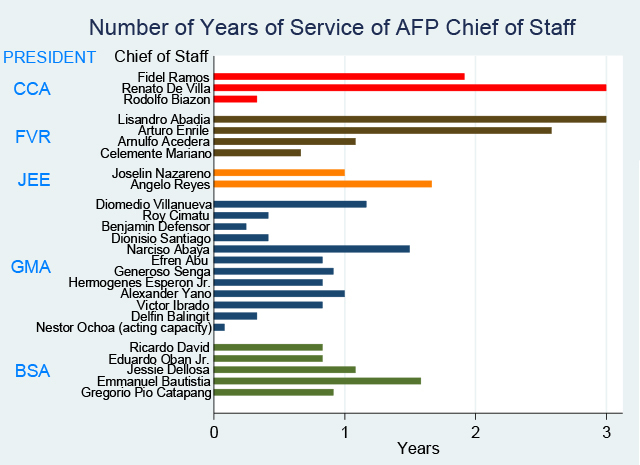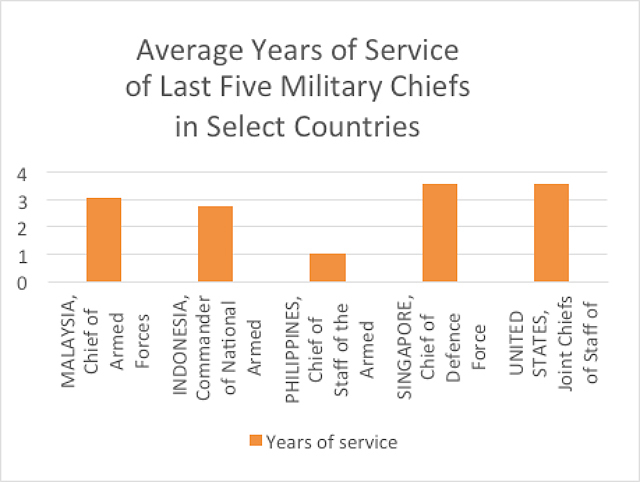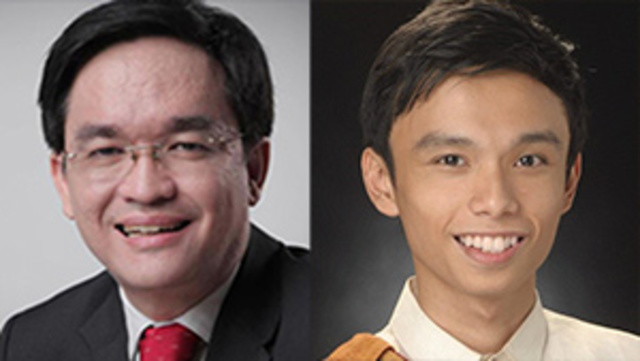A constantly changing leadership and institutional environment for the military could be detrimental to the military and its personnel
Under the 1987 Constitution, the primary government body mandated to guard national security and territory is the Armed Forces of the Philippines (AFP).
Comprised of
three major services (the Philippine Army, the Philippine Navy and the
Philippine Air Force), the AFP is put under the command and control of a
civilian, the President, who acts as its Commander-in-Chief. The President
exercises control over the entire AFP through the Department of National
Defense, which is headed by the Secretary of National Defense. In pursuing its
mandate, the AFP has to ensure that its internal system is fully functional
through a chain of command.
While remaining
externally apolitical, the AFP has to create an internal culture of a stable
environment. To be successful in carrying out sustainable programs, the
institution also needs to sustain good governance within its organization.
Changing roles
of the AFP
When the late
President Ferdinand E. Marcos declared martial law in 1972, the military
establishment grew in political prominence. The military was viewed with fear
as Marcos' private army. Within the institution though, cracks started with the
AFP promotion system that was based largely on personal loyalty to the
President.
Marcos chose his
trusted military officer Fabian C. Ver in 1981 as chief of staff, who further
instituted favoritism in the military to the disappointment of qualified
officers. The tour of duty of favored military officers who should have been
effectively retired was extended, causing internal grumblings.
In 1986, a
faction headed by then Defense Minister Juan Ponce Enrile and AFP vice-chief of
Staff Lt. Gen. Fidel V. Ramos broke away from Marcos. This led to the People
Power Revolution that installed Corazon C. Aquino as president.
It was no
surprise that in the immediate post-Marcos era, it was a challenge for certain
military personnel to see a vastly diminished political role of the AFP in a
civilian-led society. During President Corazon Aquino's term, although the AFP
remained largely loyal to her, various coup attempts were launched against her
government either by some Marcos loyalist factions in the military or by
military officers who helped her assume power. In contrast, coup attempts were
practically unheard of during the time of her successor, Fidel V. Ramos,
perhaps because he came from the establishment.
In early 2001,
then President Joseph Estrada, who a year earlier ordered the AFP to launch an
"all-out war" against the Moro Islamic Liberation Front, was removed
from power in the two-day Edsa 2 People Power revolt.
Here, the AFP
again played a key role with the then AFP chief of staff Angelo T. Reyes
announcing a withdrawal of AFP support for Estrada. Four years later, Gloria M.
Arroyo, who finished the term of Estrada, won the presidency in a hotly
contested election, which reportedly involved the participation of some
military personnel. This fueled resentment that certain elements of the AFP
practice partisan politics. The view of the AFP as a guardian of national security
was further challenged with reported fat allowances received by military
officers upon their retirement (which led Angelo Reyes to take his own life).
Transformation
roadmap
By far, the
biggest shift in redefining the AFP role is its development of the 2028 AFP
Transformation Roadmap (AFPTR), a 15-year strategy layout which will
shepherd reform agendas and development goals.
The AFPTR’s two
main priorities are capacity-building and personnel professionalization. It is
further subdivided into three components: (1) Charter Statement, which is the
core values and mission-vision of the AFTPR; (2) Strategy Map, which blueprints
the institution’s concrete actions and end-goals in fifteen years; and (3)
Governance Scorecard, which will be the evaluation material of strategies and
plans. In essence, the AFPTR is a blueprint in laying out and executing
strategies of the AFP until the year 2028.
This strategic
blueprint developed under the term of then AFP chief of staff General Emmanuel
T. Bautista, is currently being implemented under current AFP chief of staff
General Gregorio Pio Catapang Jr. through its Performance Governance System
(PGS), with the active support of its Multi Sectoral Governance Council (PGS).
The PGS, a local
adaptation of Kaplan & Norton's Balanced Scorecard, helps provide
organizations a mechanism to translate their visions into actionable and
concrete strategies through measurable outcomes that will lead to the
realization of breakthrough results which will make organizations more
sustainable and more responsive. The establishment by the AFP of the MSGC
(chaired by former Secretary Dr. Jesus Estanislao) highlights the AFP's thrust
in pursuing genuine reforms in the military, particularly in promoting good
governance, while actively involving and engaging prominent persons
(representing various sectors of society including the academe, media,
commerce, other government agencies, and non-government organizations) in the
implementation of AFPTR.
Short
leadership duties
A clear area of
reform in the AFP is in the rather short term of duty of the AFP chief of staff
in the post-Marcos era.
Since 1986, the
Philippines has had 5 presidents: Corazon C. Aquino (1986-1992), Fidel V. Ramos
(1992-1998), Joseph Ejercito Estrada (1998-2001), Gloria M. Arroyo (2001-2010),
and Benigno S. Aquino III (2010-present).
In nearly three
decades of the past four and incumbent presidents of the country, there have
already been 26 men who have held the post of AFP chief of staff (with one in
acting capacity, Nestor Ochoa). The President with the most number of persons
serving as AFP chief of staff was Arroyo who had a total of 11 in a little less
than 10 years. It was also under Arroyo’s term that Benjamin Defensor served as
AFP COS with only more than 2 months in position.
Figure 1: AFP Chiefs of Staff: 1986 to current

Note: Authors’ estimates based on media sources on duty periods of post-Marcos AFP Chiefs of Staff
President Benigno S. Aquino III has also continued this revolving door policy in appointing the chief of staff, with General Catapang being the fifth AFP chief of staff to serve under the term of PNoy. On average, thus, PNoy has appointed a chief of staff annually.
This period of
duty for a chief of staff in the AFP is extremely fast-phased, especially in
relation to other ASEAN countries like Malaysia ,
Indonesia , Singapore and to the United States of America
Figure 2. Average Years of Services of Military Chiefs or Commanders in Select Countries
Note: Authors’ estimates based on numerous media sources
The two bills also reached their third and final reading. However, the President unfortunately vetoed the bill that aimed to curtail the revolving door policy on appointments to the chief of staff and improve governance of the AFP.
The President’s
veto said that the bill was against Article 16, Sec.5 of the 1987 Constitution,
which states that "Laws on retirement of military officers shall not allow
extension of their service." However, the President could select a future
chief of staff whose term could fit 3 years, and the same goes for army, air
force and navy commanders.
In previous
times, even the superintendent of the Philippine Military Academy (PMA) had a
tour of duty of three months, an extremely short period for anyone serious in
making changes in the PMA, whether in its curriculum, or pedagogical practices.
Under the current
legislative set-up, the Commission on Appointments also has the power to
confirm all appointments of ranking generals and flag officers in the AFP.
While there is sense to have such check and balances especially over commanders
of the three services, and the AFP chief of staff and vice chief of staff, one
wonders whether this practice of having would-be-generals go through the rigors
of appointment processes in the legislature politicizes the military.
Clearly, the
executive and legislative leaders will need to seriously work together in
transforming the AFP into becoming more mission capable against internal or
external threats to national security.
In the wake of
emerging threats to national security, the country needs not only to have
increased defense
spending that includes investments in equipment for our troops, but
also improved governance by which the military organization is directed and
controlled.
Giving a fixed
term to the AFP chief of staff, the commanders of the three AFP major services,
and the PMA superintendent will be a mechanism to provide better opportunities
in implementing necessary reforms in the military service, including the AFPTR,
thus ensuring better governance for our national defense.

Martin Joseph M. Raymundo is a Research Analyst at the Philippine Institute for Development Studies (PIDS). He received a bachelor’s degree in Development Studies from the University of the Philippines Manila in 2014, where he graduated cum laude.

No comments:
Post a Comment
Note: Only a member of this blog may post a comment.